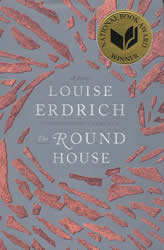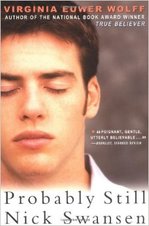
I found myself thinking about past years and past collections of nominees. One of my favorite winners is Kimberly Willis Holt’s When Zachary Beaver Came to Town in 1999. It is a wonderful book and continues to draw my attention. I frequently teach it and often recommend it to students, family, and friends. However, a quick look back at the rest of the final five reminds us of the quality of literature that might be found in a group of finalists. The finalists that year included: Speak by Laurie Halse Anderson, The Birchbark House, by Louise Erdrich, The Tolls, by Polly Horvath, and Monster, by Walter Dean Myers. I suggest that is a list full of quality literature. No one associated with the teaching and research of Young Adult Literature can deny the impact of both Speak and Monster. Both books had an immediate impact and continue to be frequently taught*. Louise Edrich has a tremendous repertoire that includes Love Medicine in 1984 and The Round House in 2012 that won the National Book award for Fiction. I am least familiar with the work of Polly Horvath. After browsing her website and reading some reviews, I began to wonder what is wrong with me. It is clear that I have been missing out. Her books are included on many award lists and she won the National Book Award for Young People for The Canning Season in 2003. It seems to me that we could pick a year and have a great experience revisiting the nominees. That might even be another great class assignment. Why not let each student select a year, read the five finalists, and make a new evaluation. Which books survive the test of time? Which ones have been embraced and for which reasons? Which titles have we neglected that we should reintroduce to our students and our classrooms?

I continue to find Pete Hautman’s Godless an intriguing read. The book conjures up questions of belief and how adolescents embrace or reject the beliefs of their parents. How committed are we to allowing adolescents to think critically? Virginia Euwer Wolff won me over from the very beginning with Probably Still Nick Swansen, but her winning book, True Believer, in 2001 is a masterpiece. I generally find award speeches very interesting, and I was revisiting them after reading Sharon’s offering. Wolff’s speech given just a few short months after the 9/11 catastrophe took my breath away. I was taken aback by the grace and power of her simple words that suggest what writing and teaching literature is about. Finally, in this section I can’t stop without mentioning Holes by Louis Sachar. When I talk with either pre-service or in-service English teachers, I state that if I were teaching an AP Literature class again I would start with Holes. It is a fantastic novel to introduce all kinds of themes, a fractured timeline, a story within a story, magical realism, race relationships, gender issues, and interesting dialogue. Let’s face it; there isn’t a good reason not to use a book like this as a touchstone text for AP students. They need to think critically, provide evidence, and demonstrate the literary quality as they answer the question. We are often too hung up on lexile scores or books that are too far removed from our student’s interests.
So, if it’s ‘absolutely true’ that there are young people who experience this every day, what makes this the most banned book? I started researching to see why, and found the same tired justifications for banning other books: violence, sexually explicit, etc., etc. What I found interesting was this from the Guardian:
"Announcing the top 10 titles most frequently “challenged” in the US in 2014, the American Libraries Association said that it had been “tracking a significant number of challenges to diverse titles”, and that “authors of colour, as well as books with diverse content, are disproportionately challenged and banned."
Yes, Alexie's book evokes a strong response and it should. If we have reached the point where we are too callused to response to the desperate situations of others what have we become?
I just finished my fourth reading of Kathryn Erksine’s Mockingbird. I am quite sure I could turnaround and read it again tomorrow and find something new that demonstrates a command of language, symbolism, craftsmanship, and a number of other characteristics that demonstrate the novel’s literary quality. However, for me, the power of the book exists in the way it captures emotion. Every time I read how the loss of a child has brought Caitlyn’s father to his last reserve of strength, I am moved. Not only does Erskine capture the emotions of Caitlyn as she struggles to understand the world and her loss through the lens of Asperger syndrome; she captures the emotions of many of the characters throughout the novel.
Please, browse through titles and read some award speeches. Make a list of books that you should discover for the first time and those you ought to revisit. Leave a comment and take me to task for not citing your favorite novel from this list of winners.
*I am in the midst of a large of Young Adult Literature syllabi. Speak, Monster, and The Absolutely True Diary of a Part-Time Indian are clearly among the top ten books included in syllabi across the country.

 RSS Feed
RSS Feed